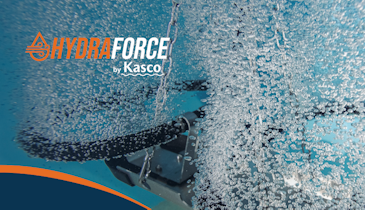Interested in Treatment?
Get Treatment articles, news and videos right in your inbox! Sign up now.
Treatment + Get AlertsPolyfluroalkyl substances, known as PFAS, are man-made chemicals found in everyday items such as nonstick fast-food wrappers, stain-resistant fabrics, nonstick cookware, firefighting foams, and the manufacturing of certain papers.
The chemical bond of these substances is so strong they take decades to break down. In addition to being found in various items we use day-to-day, PFAS can be found in rivers, lakes, streams, aquifers, and municipal and private wells nationwide. Evoqua offers a variety of solutions for removing PFAS, perfluorooctanoic acid (PFOA), and perflurooctane sulfonate (PFOS) — collectively known as PFCs — from drinking water or process water.
Typically, removing PFCs from water involves carbon or ion exchange resin. There are several successful sites where these systems have proven effective and exceed the US Environmental Protection Agency Health Advisory Limits. PFC removal from water can also include other treatment solutions such as reverse osmosis.
With customer collaboration, Evoqua evaluates the water to be treated with pilots, bench scale testing or accelerated bench scale testing to determine which media and process will work most effectively with local water chemistry. Evoqua’s goal is for its customers to achieve clean, safe, PFC-free water.
The company has proven carbon and resin solutions permanently installed in municipal drinking water plants, lowering PFAS counts to non-detect levels, and has emergency and mobile solutions for PFAS removal in both municipal drinking water and industrial process water applications.
Additionally, Evoqua has PFAS and emerging contaminant removal systems both permanently installed, and temporarily connected at Air Force bases, airports, drinking water facilities, groundwater remediation sites, dairy farms and industrial locations.
Two highlighted communities are successfully removing PFAS from their water using Evoqua systems. Kennebunk, Kennebunkport & Wells Water District (KKWD) in Maine is using a carbon system, while Stratmoor Hills Water District (SHWD) in Colorado is successfully utilizing an industry-first resin application system.
Tourist town Kennebunkport, Maine, found PFOA and PFOS in one of its drinking water wells. Although the levels were below the EPA Health Advisory Limit, the town was unwilling to risk public exposure to the chemicals. The district traced the source of the contamination to local agricultural runoff of pesticides from local farms into the Mousam River. The farms had utilized soil enhancers made from biosolids and fly-ash, a byproduct of a local paper mill, which were the original carriers of the compounds. The water district shut down the well and searched for a treatment solution. Evoqua and KKWD piloted several types of granular activated carbon to determine which performed best given the district's local water chemistry. KKWD had a treatment goal of non-detect levels of PFCs. Extensive testing showed that carbon made from coconut was most effective at removing PFCs from drinking water.
To achieve their treatment goal KKWD installed a two-vessel lead-lag GAC system with a sand filter. This serves a population that varies from about 28,000 to about 75,000 at the height of tourist season.
KKWWD has achieved its goal of providing water to its community with non-detect levels of PFOA and PFOS.
The small, unincorporated township of Stratmoor Hills is located in the foothills of Cheyenne Mountain in southern Colorado Springs. The community’s water security is the responsibility of the Stratmoor Hills Water District, which oversees a combination of surface and groundwater sources. SHWD found one of its wells combined levels of PFOA, PFAS and PFHpA higher than the EPA’s HAL. Evoqua was selected to treat SHWD's drinking water for all three PFCs.
Among the District’s solution requirements was the need for a smaller system footprint, an ability to move the vessels seasonally, and to have a fast setup and startup.
SHWD and Evoqua worked together to develop an innovative, industry-first application of single-use, selective ion exchange filtration specifically aimed at countering the threat of PFOA and PFOS contamination. Evoqua has pioneered the use of selective IX resins that have been extensively used in California and Massachusetts for removing perchlorate, a contaminant with similar electro-chemical properties to PFCs. With single-pass instead of regenerable resin, operating costs and on-site materials would be minimized over a 10-year lifetime. In addition, the ion-exchange resin promised to be more suitable to the seasonal use of the well.
The ion-exchange resin system removes PFCs including PFOS, PFAS and PFHPA from drinking water to levels that not only exceed the EPA’s HAL but removes the PFCs to near non-detect levels.
Because the IX resin is single-pass there are no chemicals on site and no liquid waste.
Evoqua believes that every community’s water is different and deserves a specifically tailored solution, and that every community should have access to clean, safe water. That’s why it has many options when it comes to levels of ownership. From capital purchase to renting or leasing, and from build-own-operate to pay-per-gallon, Evoqua encourages the dialog that will quickly gain a community access to safe drinking water.
The company also partners and collaborates with engineering firms as a matter of course. Its solutions integrate with systems in projects large and small throughout North America and many global locations. Evoqua’s experts have deep expertise in their fields and see their solutions solve big problems like PFAS and the removal of emerging contaminants every day.
Evoqua’s water treatment solutions are myriad and range from complete municipal wastewater treatment systems to high-purity ultrafiltration for circuit washing pharmaceutical and other laboratory uses, chemical and ultraviolet disinfection for municipal drinking water, systems integration in power plants, refineries and chemical facilities, and much more. With every system and solution comes a fruitful and successful collaboration with an engineering firm who shares the same high standards for excellence and safety.
Evoqua transforms water and together with customers, collaborators and partners, enriches life.






